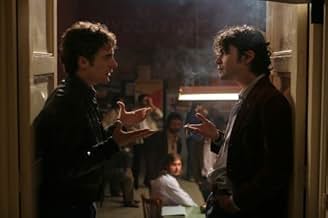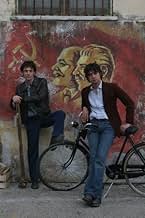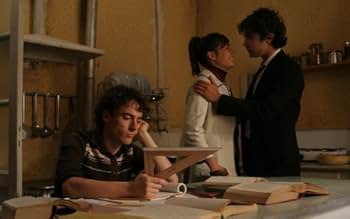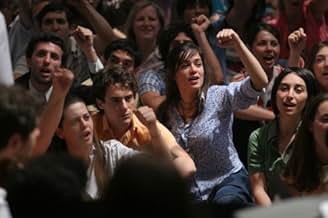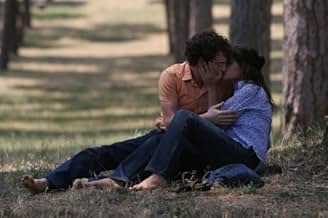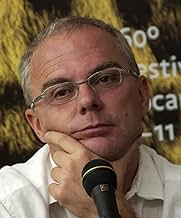IMDb RATING
7.0/10
6.9K
YOUR RATING
Two brothers come of age in a small Italian town in the '60s and '70s.Two brothers come of age in a small Italian town in the '60s and '70s.Two brothers come of age in a small Italian town in the '60s and '70s.
- Awards
- 19 wins & 29 nominations total
Antonino Bruschetta
- Segretario Bombacci
- (as Ninni Bruschetta)
Featured reviews
Good Italian movies are few and far between – the last I saw was Zefferelli's "Tea with Mussolini", and before that, "Life Is Beautiful". It seems that Italian movies, good or bad, are rare. If the list in Wikipedia is anything to go by, Italy produces about ten to fifteen features a year, far less than Australia.
This one is about growing up in a post-Mussolini, post-war world as a working class Italian. The narrator, Accio (Elio Germano), bright but temperamental, is not the most pleasant of people (his name means bully). At 13 he is sent off to a seminary by his long-suffering and pious parents but even though it's a fairly humane regime he doesn't last long. So it's back to the family's tiny, crumbling flat to grow up with his older brother, Manrico (Riccardo Scarmarcio). Rejecting religion, Accio comes into the orbit of the local fascists, though he is more interested in action than ideology. The handsome, charming Manrico becomes a communist, and beds Francesca (Diane Fleri), an attractive middle class girl who has joined the comrades. Naturally Accio gets interested in Francesca as well.
The story covers the period 1962 to 1968 and plenty of reference is made to the turmoil of the times, but basically it is about a textbook case of sibling rivalry. Acco and Manrico cannot keep their hands off each other – in order to fight, that is. Acco however does manage to reach some sort of maturity at the end.
The story moves along at a good pace and there are plenty of funny scenes. The best one is the occupation by the communist students during the 1968 disturbances of the Rome conservatory where they perform Beethoven's "Ode to Joy" with the words changed to communist slogans, and are then invaded by the fascists crying "Don't mess with Beethoven" (actually the original words were from a poem by Schiller). The switch of actors (Vittorio Propizio plays the younger Accio) is accomplished in a particularly neat fashion, using a method I last saw used in "Conan the Barbarian" where the older actor is substituted in mid-scene.
In the background is Mussolini's legacy, an angry, confused and humiliated nation without a clear sense of direction. His 1930's "new towns" like Latina on the Pontine marches, jerry-built and badly designed, were crumbling already by the 1960s. Replacement housing had been built but corrupt local officials were holding up its allocation. There is a very satisfying moment at the end of the film when Accio, no stranger to causing a ruckus, takes remedial action.
Not being Italian I probably missed a lot, but the film held my attention for its full length, despite Accio not being a particularly nice lad (then neither was Genghis Khan and he had an interesting life). The film is bright, fresh and fast-moving though I'm not sure about the climax, which is rather on the melodramatic side. If the Italians can bring themselves to make more movies of this quality, I'll come along to watch.
This one is about growing up in a post-Mussolini, post-war world as a working class Italian. The narrator, Accio (Elio Germano), bright but temperamental, is not the most pleasant of people (his name means bully). At 13 he is sent off to a seminary by his long-suffering and pious parents but even though it's a fairly humane regime he doesn't last long. So it's back to the family's tiny, crumbling flat to grow up with his older brother, Manrico (Riccardo Scarmarcio). Rejecting religion, Accio comes into the orbit of the local fascists, though he is more interested in action than ideology. The handsome, charming Manrico becomes a communist, and beds Francesca (Diane Fleri), an attractive middle class girl who has joined the comrades. Naturally Accio gets interested in Francesca as well.
The story covers the period 1962 to 1968 and plenty of reference is made to the turmoil of the times, but basically it is about a textbook case of sibling rivalry. Acco and Manrico cannot keep their hands off each other – in order to fight, that is. Acco however does manage to reach some sort of maturity at the end.
The story moves along at a good pace and there are plenty of funny scenes. The best one is the occupation by the communist students during the 1968 disturbances of the Rome conservatory where they perform Beethoven's "Ode to Joy" with the words changed to communist slogans, and are then invaded by the fascists crying "Don't mess with Beethoven" (actually the original words were from a poem by Schiller). The switch of actors (Vittorio Propizio plays the younger Accio) is accomplished in a particularly neat fashion, using a method I last saw used in "Conan the Barbarian" where the older actor is substituted in mid-scene.
In the background is Mussolini's legacy, an angry, confused and humiliated nation without a clear sense of direction. His 1930's "new towns" like Latina on the Pontine marches, jerry-built and badly designed, were crumbling already by the 1960s. Replacement housing had been built but corrupt local officials were holding up its allocation. There is a very satisfying moment at the end of the film when Accio, no stranger to causing a ruckus, takes remedial action.
Not being Italian I probably missed a lot, but the film held my attention for its full length, despite Accio not being a particularly nice lad (then neither was Genghis Khan and he had an interesting life). The film is bright, fresh and fast-moving though I'm not sure about the climax, which is rather on the melodramatic side. If the Italians can bring themselves to make more movies of this quality, I'll come along to watch.
There's this much to be said for this movie from the ranks of Italy's new young directors and actors: The quality of the acting was at least one notch above the usual fare, which almost never transcends the clichéd facial expressions and intonations we expect to find in TV dramas and sit-coms. This new generation of actors and directors was raised on US television imports ("telefilms") and Latin-American soaps, and it definitely shows in the uninspired and uninspiring quality of their work. And one gets the impression that 90% of them come from Parioli, a very well-to-do neighborhood of Rome, that would be the rough equivalent of coming from Santa Monica, Lake Forest IL, or Westport Conn—all those perfectly groomed faces coming from families of the Italian haute bourgeoisie with unlimited funds to advance their children's "acting career." If it weren't for Elio Germano as Accio (as well as Luca Zingaretti as Accio's fascist mentor and Anna Bonaiuto as his wife), this movie would probably fall into the same category of banalized film-making with all the rest.
But Germano's performance is not enough to salvage a film that fails to rise above a rating of "mediocrity +". Certainly it was an interesting idea to situate the action in Latina, a city built from scratch by Mussolini's fascist regime after it had drained the surrounding swamp land (the "bonifica" that was one of Fascism's highly touted achievements). All of the city's architecture was inspired by fascist "monumental" design.
Regrettably, Luchetti has done little of interest to exploit this setting for his family drama other than to bring up the same old cliché of opposing extremisms (the thuggery of the neo-fascist right vs. the banditry and targeted terrorism of the extra-parliamentary left). And the drama of the conflict between these two extremisms is used altogether too much to drive the plot forward. Some Italian commentators disliked this film because it seemed to go over the same old ground in the same old way—when it was time, presumably, to move on to new subjects. But the problem was not that it rehashed Italian history—the problem was the "hash." Bellocchio, after all, did a wonderful job of re-interpreting to Italians the experience of the Red Brigades in his "Buongiorno,Notte".
But here the audience is simply given a choice between fascist hooliganism and a lunatic left, when actually the situation in Italy in the 60s and 70s was much more complicated and nuanced. Millions of Italians belonged to parties and movements that were seriously committed to a progressive transformation of Italy that did not involve knee-cappings and assassinations. And so Luchetti ends up confirming (perhaps despite himself) the American/Berlusconiano vision of the world: "Forget about ideology—it's all about individual freedom and authenticity in your personal relationships." And finally we can see the effects of Berlusconi's TV stations and their ilk also in the movie's script. After 20, I stopped counting how many times the characters said, "Ma Che Cazzo Dici?"("What the f#%k are you saying?"). It is a measure of the moronization of the Italian public under the sway of Berlusconi and Berlusconian media that the scriptwriters think that they can get a laugh out of an Italian audience with this phrase each and every time it is said—and sadly they're probably right.
But Germano's performance is not enough to salvage a film that fails to rise above a rating of "mediocrity +". Certainly it was an interesting idea to situate the action in Latina, a city built from scratch by Mussolini's fascist regime after it had drained the surrounding swamp land (the "bonifica" that was one of Fascism's highly touted achievements). All of the city's architecture was inspired by fascist "monumental" design.
Regrettably, Luchetti has done little of interest to exploit this setting for his family drama other than to bring up the same old cliché of opposing extremisms (the thuggery of the neo-fascist right vs. the banditry and targeted terrorism of the extra-parliamentary left). And the drama of the conflict between these two extremisms is used altogether too much to drive the plot forward. Some Italian commentators disliked this film because it seemed to go over the same old ground in the same old way—when it was time, presumably, to move on to new subjects. But the problem was not that it rehashed Italian history—the problem was the "hash." Bellocchio, after all, did a wonderful job of re-interpreting to Italians the experience of the Red Brigades in his "Buongiorno,Notte".
But here the audience is simply given a choice between fascist hooliganism and a lunatic left, when actually the situation in Italy in the 60s and 70s was much more complicated and nuanced. Millions of Italians belonged to parties and movements that were seriously committed to a progressive transformation of Italy that did not involve knee-cappings and assassinations. And so Luchetti ends up confirming (perhaps despite himself) the American/Berlusconiano vision of the world: "Forget about ideology—it's all about individual freedom and authenticity in your personal relationships." And finally we can see the effects of Berlusconi's TV stations and their ilk also in the movie's script. After 20, I stopped counting how many times the characters said, "Ma Che Cazzo Dici?"("What the f#%k are you saying?"). It is a measure of the moronization of the Italian public under the sway of Berlusconi and Berlusconian media that the scriptwriters think that they can get a laugh out of an Italian audience with this phrase each and every time it is said—and sadly they're probably right.
I rushed to see this movie, with Elio Germano, perhaps the best Italian actor of his generation, and Riccardo Scamarcio, the heartthrob of the moment. I got upset about the rejection from the snobbish Cannes Festival and I wanted to see the film by myself. Now, after having seen it, unfortunately, I have to agree with the Cannes decision. The film is a tired rehash of other books/films/TV done indifferently and boringly with two saving graces: Elio Germano's and Angela Finocchiaro's performances. The rest is, quite frankly, unendurable. The film felt long, long, long and I got more and more impatient and eventually angry with the whole thing. The Italian cinema that once was a power force of inspiring themes and ideas seems to have arrived to a total dead stop. The artists, I feel, with something new to say, like Libero Di Rienzo - have you seen his "Sangue" with Elio Germano as well? No, I bet you haven't. It was released in secrecy and for my money, his movie had something new to say in a totally new exciting way. I fear we, in Italy, can't move forward because we're trapped in some king of structure that it's terrified of new ideas. As a consequence we have films like this one. A throw back to the past and not in a nice way. Cannes? Are you nuts?
Based on the novel by Antonio Pennacci, "My Brother is an Only Child" is a tale of two brothers growing up in Italy in the turbulent 1960s and '70s. Though remarkably alike in disposition and temperament, the two siblings, nevertheless, find themselves on opposite ends of the political spectrum. Manrico (Riccardo Scamarrio), the older of the two, is a committed Communist who rallies the workers in his town to stand up for their rights. Accio (Elio Germano), his younger brother and also the narrator of the story, is a hardcore Fascist who venerates Mussolini and participates in violent protests against the Marxists. A hothead and a bully by nature, Accio (the name actually means "bully" in Italian) finds a convenient outlet for his rage and violence in the thuggery and strong arm tactics he and his fellow fascists use against their adversaries. Manrico and Accio have obviously had a tumultuous love-hate relationship their entire lives, and things get even more complicated when Accio falls in love with Manrico's girlfriend, Francesca. But each man must ultimately decide where his true loyalty finally lies - with family or with the ideological cause that moves and empowers him. This becomes an even more complex question when one of the brothers becomes increasingly disillusioned with the goals and tactics used by his side, while the other grows increasingly radicalized in his commitment to his.
Director Daniele Luchetti brings renewed life to the coming-of-age genre with his intense concentration on the sociopolitical elements of the story. It gets so bad between the two warring factions that even a performance of Beethoven becomes a pretext for bloodshed and violence. And the constant tussling between the two brothers - who can't seem to see eye-to-eye on anything except the girl they love - becomes a microcosmic reflection of the larger world around them.
Uniformly superb performances and naturalistic direction make this a complex and ultimately very moving study of brotherhood, family, maturity and commitment.
Director Daniele Luchetti brings renewed life to the coming-of-age genre with his intense concentration on the sociopolitical elements of the story. It gets so bad between the two warring factions that even a performance of Beethoven becomes a pretext for bloodshed and violence. And the constant tussling between the two brothers - who can't seem to see eye-to-eye on anything except the girl they love - becomes a microcosmic reflection of the larger world around them.
Uniformly superb performances and naturalistic direction make this a complex and ultimately very moving study of brotherhood, family, maturity and commitment.
'My Brother is an Only Child' tells the story of two red-blooded siblings as they take their first steps into political and sexual adulthood in the Italy of the 1960s. It's an intriguing premise, but for me, it didn't quite come together. Specifically, the fascism and communism that its protagonists pursue seem obviously unappealing: the film fails to convey how anyone could follow such causes except out of immaturity, though there are some funny moments (the new leftist lyrics to Beethoven's Ninth Symphony the most obvious of them). At the end of the film, a housing scandal is exposed, but the film doesn't really explain how the scam had worked: the story would make sense if the houses in question hadn't actually been built, but in fact they have been, and one senses that the writer has resolved a happy ending without worrying too much about the details. What's nice about this film is its portrait of a place and a time, and the very believable love-hate relationship between the brothers; but if you weren't there yourself, perhaps its inevitable that you find yourself looking in from the outside.
Did you know
- TriviaTaken from the novel "Il fasciocomunista", the title has been changed in "Mio fratello è figlio unico" as a tribute to the eponymous song by Rino Gaetano.
- SoundtracksSul mio carro (Chariot)
Performed by Sonia Cruceru
- How long is My Brother Is an Only Child?Powered by Alexa
Details
- Release date
- Countries of origin
- Official sites
- Language
- Also known as
- My Brother Is an Only Child
- Filming locations
- Production companies
- See more company credits at IMDbPro
Box office
- Budget
- €5,000,000 (estimated)
- Gross US & Canada
- $255,620
- Opening weekend US & Canada
- $9,357
- Mar 30, 2008
- Gross worldwide
- $12,894,062
- Runtime1 hour 40 minutes
- Color
- Sound mix
- Aspect ratio
- 1.85 : 1
Contribute to this page
Suggest an edit or add missing content

Top Gap
By what name was Mon frère est fils unique (2007) officially released in India in English?
Answer





